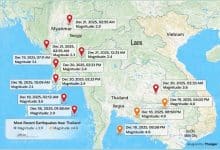A family of three grooms Vietnam’s most edible golf course

One of Vietnam’s leading golf layouts, Laguna Golf Lang Company, is staying at the top of its maintenance game with the talents of a very special group of greenkeepers.
A family of water buffalo.
As every superintendent worth their salt will tell you, prime conditioning is key to the success of every leading golf course.
Dedicated greenkeeping staff at top clubs around the world deploy sophisticated hardware and a variety of innovative techniques to keep their layouts in world-class nick.
The legwork involved in maintaining the elevated status of the layout – a spectacular Nick Faldo-designed track where golfers encounter tropical jungle, ocean sand dunes, and rice paddies – is shared between man, machinery and beast.
“We are pretty sure it’s a first in this part of the world to have animals performing such an important role on the golf course,” said Adam Calver, Director of Golf, of the work carried out by father Tu Phat, mother Chi Chi and their calf, Bao, tending to four-hectares of rice fields located right in the middle of the course.
The paddies contour the 3rd and 4th holes and reappear in the back nine between the 13th green, 14th tee and run alongside the 15th fairway.
In the early days of golf, when courses were mostly laid out on public land it was not uncommon for sheep and cattle to roam freely across fairways and greens.
Even today at some courses – notably the wilder links clubs in remote regions of Scotland and Ireland – livestock play their party in trimming turf and thinning out rough.

Courses in Asia though have been less willing to let animals in on the greenkeeping act – until now that is.
Even on the quietest days, the water buffalo are always out wading through the rice paddies and performing their duties.
“We looked at various methods to increase the aesthetics of the rice paddies between the harvests as continually mowing the fields to maintain vast rice terraces can consume a large amount of labor,” adds Calver.
“The water buffalo act as bio-mowers while also protecting the traditional Vietnamese landscape.”
The bovine threesome help to manage the paddies by eating excess weeds and crops in the area that would otherwise require machinery and manpower to maintain.
Not only do the animals provide a vital service in tending to the paddies, they supply an additional appealing optic to one of the most eye-catching sections of a golf course that is already strong on visual manna.
The paddy though is not just for show. Harvested twice a year, they yield up to 20 tons of rice that are used to support the organic farm and donated to families and seniors in the area.
“We knew that having the holes weave through the rice fields would be a unique and memorable experience for golfers,” said Paul Jansen, the leading golf course architect who assisted Faldo with the design of the course.
“And also, there would be potential to give back to the community in a sustainable and regenerative fashion. All the best golf courses have character and sense of place and we felt if we could adapt our surroundings then we would be close to achieving something really good.

Latest Thailand News
Follow The Thaiger on Google News:


























